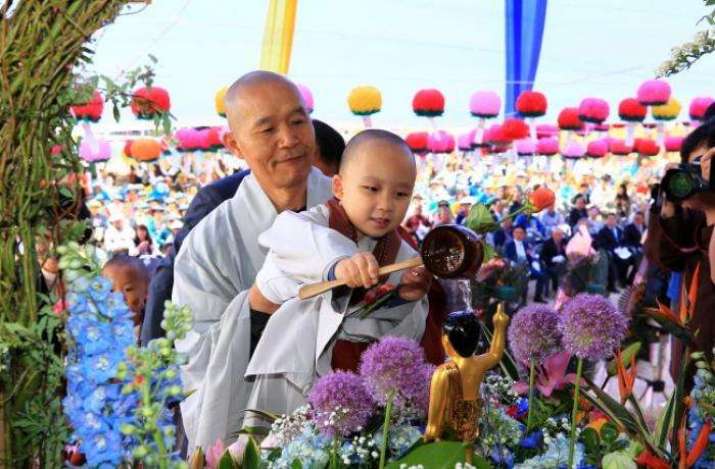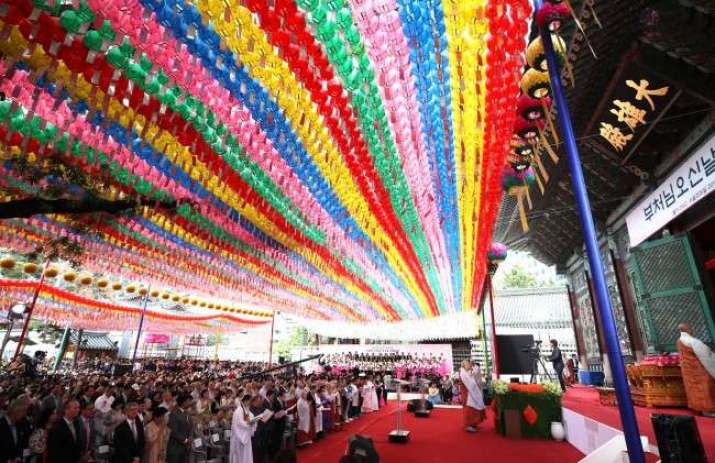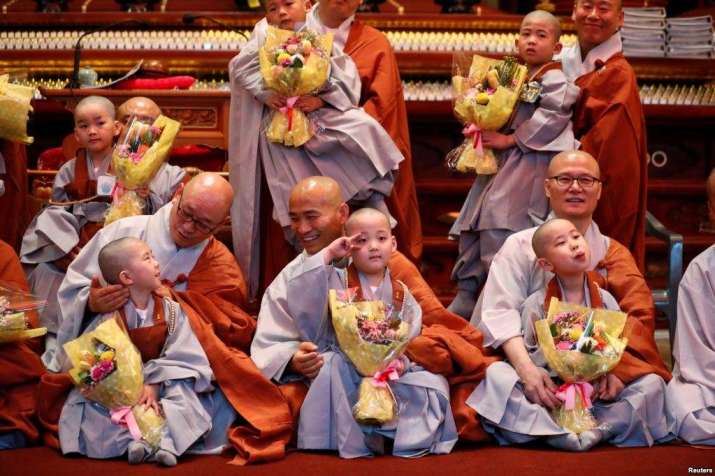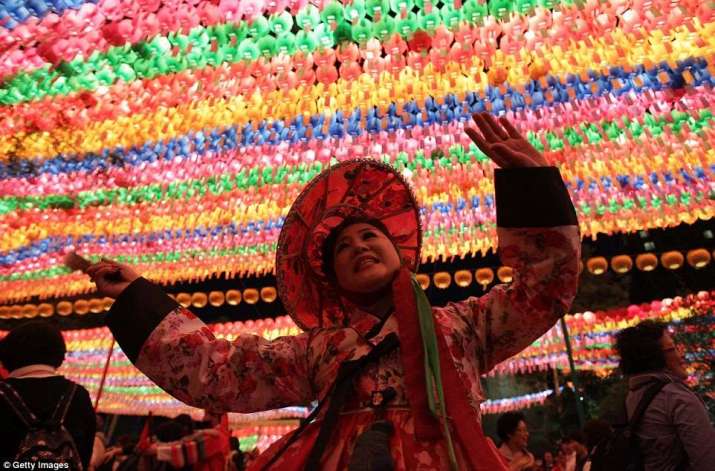NEWS
Two Koreas Celebrate Vesak With Joint Prayer
 A monk and a novice bathe a Buddha statue together in commemoration of the Buddha’s birth. From asianews.it
A monk and a novice bathe a Buddha statue together in commemoration of the Buddha’s birth. From asianews.itBuddhists in South Korea gathered on Tuesday to celebrate the Buddha’s 2,562nd birthday, an occasion marked by colorful lanterns, boy monks, and a joint inter-Korean prayer for peace.
In the wake of last month’s inter-Korean summit, The Jogye Order of Korean Buddhism and North Korea’s Buddhist Federation adopted an inter-Korean prayer to mark the religious celebration. Earlier this month, North Korea’s Buddhist Federation sent a draft of the prayer to its South Korean counterpart.*
The prayer was recited simultaneously by members of both groups during their respective services. It was the first time in three years that North and South Korean Buddhist organizations adopted a joint prayer in celebration of the Buddhist holiday.
The Panmunjom Declaration “is a flare announcing a new start of history, and a landmark to open up a new era of autonomous unification and connect the divided peoples [of South and North Korea],” the prayer read. It also stated that the declaration was an affirmation of the principle of self-determination, allowing both Koreas to decide their own fate. (AsiaNews.it)
Ten thousand monks, nuns, and lay Buddhists gathered at Jogye-sa, the Jogye order’s main temple in downtown Seoul, to pray for peace and witness the occasion. Among them were the Most Venerable Jinje, the supreme patriarch of the Jogye Order of Korean Buddhism, and the Most Venerable Seoljeong, the body’s chief administrator.
 Celebrating the Buddha’s birthday Jogye-sa. From asianews.it
Celebrating the Buddha’s birthday Jogye-sa. From asianews.itIn his keynote speech, the Most Venerable Jinje welcomed an era of peace and prosperity on the Korean Peninsula, expressing the growing hope for peace following the inter-Korean summit and the adoption of the Panmunjom Declaration. He called upon all Koreans to rid their hearts of distrust and conflict via mediation and to recover a sense of unity through mutual understanding.
The Most Venerable Seoljeong also referenced the improved relations and noted that peace had finally come for the two Koreas after a long winter of division. He urged all South Koreans to rise above division—be it political or related to social class—and to unite to bring about lasting peace.
South Korean President Moon Jae-in sent a congratulatory message to the congregation, which was read aloud by culture minister Do Jong-hwan. The message urged the Buddhist community to pray for an era of peace and prosperity on the Korean Peninsula.
 Temporarily ordained novice monks pose for photographs at Jogye-sa in Seoul. From voanews.com
Temporarily ordained novice monks pose for photographs at Jogye-sa in Seoul. From voanews.comThe Buddha’s birthday is known Chopail (초파일) in North Korea, where it is occasionally designated as a public holiday. Although North Korea officially discourages religious practices, its attitude toward Buddhism is more complex. Buddhism reached the Korean Peninsula in the fourth century and, with a history of more than 1,600 years, far predates the Korean War and the division of the two Koreas. Over the centuries, Buddhism has become part of (pan-)Korean culture and history, two aspects actively promoted by and celebrated by the North-Korean regime.
Popularly known around the world as Vesak, the Buddha’s birthday is a public holiday in South Korea known as Seokga Tansinil (석가 탄신일), although its formal name was changed to “The Day of Buddha’s Coming” (Bucheonim Osin Nal, 부처님 오신 날). It is observed by hanging colorful lotus lanterns in temples, homes, and streets, and on the day itself, many people make their way to temples to participate in rituals and prayers, to wish for the well-being of family members, and to meditate on the Buddha’s teachings. The theme of this year’s celebration was “Together, we go as one,” reflecting both improved relations between the Korea’s and the healing of other societal rifts in South Korea. (Arirang News)
Buddhism is a major religion in South Korea with an estimated 10 million adherents. The Birthday of the Buddha is celebrated on the eighth day of the fourth month in the Korean lunar calendar (22 May this year), and has been a designated public holiday since 1975.
 The Buddha’s Birthday is celebrated with brightly colored lotus lanterns and lantern parades in South Korea. From dailymail.co.uk
The Buddha’s Birthday is celebrated with brightly colored lotus lanterns and lantern parades in South Korea. From dailymail.co.ukDuring the historic inter-Korean summit at Panmunjom on 27 April, South Korea’s President Moon and North Korean leader Kim Jong-un adopted the joint Panmunjom Declaration for Peace, Prosperity and Unification of the Korean Peninsula, in which both leaders affirmed their commitment to denuclearization and expressed a wish to bring a formal end to long-running hostilities. Since the signing of the Korean Armistice Agreement in Panmunjom on 27 July 1953, the two Koreas have officially remained at war, but the two leaders agreed to convert the armistice agreement into a full peace treaty later this year.
The historic summit is expected to be followed by a meeting between US President Donald Trump and Kim Jong-un, originally scheduled for 12 June in Singapore, although some doubts have recently been cast about when the meeting will actually take place.
* North Korean Buddhist Federation Sends Vesak Prayer to South (Buddhistdoor Global)
See more
Buddhist Bodies of 2 Koreas Adopt First Joint Prayer in 3 Years (KBS World Radio)
Korea Celebrates Birthday of Buddha (The Chosun Ilbo)
Buddhists in two Koreas pray together for peace on the Buddha’s birthday (AsiaNews.it)
Buddhists Wish for Inter-Korean Peace on Budda's Birthday (KBS World Radio)
Buddhist Leaders Express Hope for Peace Ahead of Buddha's Birthday (KBS World Radio)
Korea celebrates 2,562nd birthday of Buddha (Arirang News)
Related News from Buddhistdoor Global
North Korean Buddhist Federation Sends Vesak Prayer to South
Buddhists Pray for Peace and Unification Ahead of Inter-Korean Summit
South Korean Buddhist Monks Protest THAAD Missile Defense System
Eight Boys Ordained as Monks in Seoul Ahead of Celebrations to Mark Buddha’s Birthday














